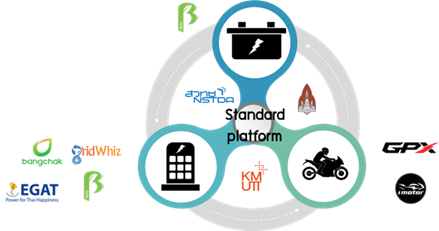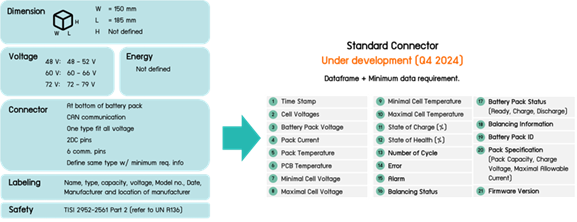-
Establishment
-
Goal & Missions
-
Alliance
Consortium Establishment
With financial support from private sector partners and the Program Management Unit for Competitiveness (PMUC) under the Ministry of Higher Education, Science, Research and Innovation (MHESI), a standardized swappable battery pack platform has been developed for Thailand.


The objective is to establish a unified technical standard for battery packs to ensure compatibility with electric motorcycles, battery swapping cabinets, and various related equipment. This standard aims to facilitate the cooperation among stakeholders by providing a common platform, making battery swapping more convenient for electric motorcycle users and promoting the sustainable advancement of Thailand’s modern automotive industry.
From 2018 to 2021, the “Research and Development Project for a Standardized Swappable Battery Pack Platform for Electric Motorcycles to Advance Thailand’s Modern Automotive Industry” was initiated through collaboration among the following:
- Research organizations: National Science and Technology Development Agency (NSTDA), King Mongkut’s University of Technology Thonburi, and Khon Kaen University
- Battery pack manufacturers: Beta Energy Solution Co., Ltd.
- Electric motorcycle manufacturers: GP Motor (Thailand) Co., Ltd., and i-Motor Manufacturing Co., Ltd.
- Battery swapping service providers: Bangchak Corporation Public Co., Ltd., GridWhiz (Thailand) Co., Ltd., and the Electricity Generating Authority of Thailand (EGAT)

-
- Physical dimensions
- Electrical requirements
- Communication and interface protocols
- Safety standards, and more

Building on the success of this collaboration, a broader cooperative network has been formed under the name: “Thailand Standard Swappable Battery Consortium for Small E-Mobility”, aiming to further expand and strengthen the ecosystem for standardized swappable battery systems for small electric vehicles.
Goal
To promote the adoption of standardized swappable battery packs that rely on domestically developed technology and manufacturing within a 3-year timeframe, with a focus on small electric vehicles.

Missions
1. Promote collaboration to establish standardized swappable battery systems for small electric vehicles, starting with electric motorcycles. This includes standardization of physical dimensions, communication protocols, plug and socket interfaces, and other related components, with standards endorsed by the government and accepted by key stakeholders—such as manufacturers, electric motorcycle users, battery swapping station providers, and others.
2. Encourage widespread acceptance and adoption of standardized battery packs, leading to mass production and broad deployment of swappable batteries that conform to a unified standard for small electric vehicles—such as electric motorcycles, electric tricycles, and other small EVs.
3. Support the implementation of standardized battery packs and battery swapping stations in key community, business, and tourism areas across the country.
4. Collaboratively develop guidelines for managing standardized swappable battery packs during their service life and after retirement from electric vehicle use, including repurposing for other applications. This ensures maximum value, safety, and environmental sustainability.
5. Foster the development and exchange of knowledge, technologies, manufacturing capabilities, human resources, and other aspects to drive the creation of a robust value chain for standardized swappable battery systems.





